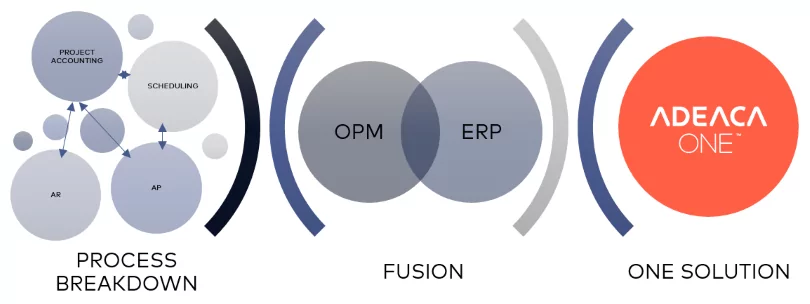Recently, I was speaking with a representative from a potential customer whose story is not unlike many others in his industry. The potential client is a large engineering firm that has grown rapidly over the last 30 years, with tens of thousands of employees offering hundreds of services and managing thousands of projects around the globe. Like many engineering and construction firms, this company faces a major issue with its ERP – prior customizations render it too costly and time-consuming to upgrade fully.
As an example, my contact related his struggles with the company’s North American region. Back in the 1990s, the firm invested in a system from Oracle that was customized for engineering and construction, promising to revolutionize their business. While it may have helped for a while, it has grown into an operational burden.
Since the system was so heavily modified to get it to work for the company’s needs, upgrading the system with new functionality meant an expensive and time-consuming forklift. When the company did upgrade, it was only in the areas without the customizations, which were mostly system-level upgrades for performance purposes. Therefore, the company missed out on all the new features Oracle released over the years, and the functional part of the system remains largely the same since the 1990s.
The system remains largely the same since the 1990s
These cases we find throughout the construction industry and especially regarding Oracle’s dominance in this industry with its highly customized solutions. At present, the entire industry is finding itself stuck with old functionality because the systems in use are so heavily customized. This non-standard functionality, that at first seems like a wonderful system that fulfills all your needs, becomes a monster in the long-run that requires constant care and drains company resources, hindering the company from reaching its potential.
The only upgrades possible are those pertaining to system performance. They cannot touch the core business logic and functionality because the services required to recreate the customizations from the old system in the new are simply too expensive. Therefore, they don’t realize any of the business value from the latest functionality.
How do you future-proof your ERP?
The question is, how can a company obtain the functionality it needs while securing a path for future enhancements that maintain the system’s viability? Answer – through a cloud solution with out-of-box functionality to meet your needs.
To capitalize on the promise of the cloud and/or SaaS that offers seamless and continuous upgrades during your subscription, you need to minimize the number of customizations you require. You need to go from a highly customized implementation to a standard one. This approach lowers the complexity of upgrading as new functionality emerges.
But, how do you go standard as a project-based business in the engineering and construction industry (or any other industry for that matter, if you organize your business activities in projects)? Mainstream ERPs were not built with projects in mind. They were built for manufacturing, retail and distribution.
I’m here to tell you that you can get Microsoft Dynamics 365 with the project functionality you need built-in. No more endless customizations and integrations that make it nearly impossible to upgrade your system.
Enter ADEACA ONE.
ADEACA has been working with its customers for the last decade to invent and refine standard project processes so that the system “customizations” you used to require become simple configurations of a base system that already encompasses your business needs.
We have gone through the painstaking work of identifying process difficulties and restructuring them to produce the right results for project-based companies. Most business processes found in traditionally project-oriented companies are managed manually and through disparate systems, which makes them extremely slow, costly and difficult to regulate. In some cases, the processes are so disconnected from the core business system, you might as well be using a calculator with pencil and paper. We have reengineered these processes and normalized all our experiences across industries to derive common best practices that apply to all companies that organize their activities in projects.
With this knowledge, we recreated the functionality found in these typically disjointed solutions within the framework of the ERP and developed ADEACA ONE for Microsoft Dynamics 365. This all-encompassing solution is streamlined, automated and enables project-oriented enterprises to operate in an unprecedented lean and real-time approach.
And, all of this comes STANDARD in ADEACA ONE. So, when Microsoft or ADEACA releases a new version with upgraded functionality, you can easily deploy it.
No more headaches or endless caring and feeding of the monster. You can enjoy the functionality upgrades as they are released.
Those customers using Dynamics AX will have an even easier time upgrading, as their data will port relatively smoothly, and they will not have to recreate any customizations in Dynamics 365. Plus, they will be able to eliminate the need for ancillary applications in their processes (i.e. Microsoft Project, Excel, etc.).
This reconstructed ERP for project-based companies addresses the most pressing issues for this potential client in the engineering & construction industry. 1) It provides a framework that integrates the company’s project functions with its back-office processes in one standard solution; and 2) it gets the company into a new, future-proof system that can grow with it. These are the reasons why this potential client is eager and excited about working with us.
Business transformation and the cloud is here for project-driven enterprises. The future is bright. Contact us if you would like to learn more about how we do it.
About ADEACA
ADEACA is a specialized Microsoft industry partner, focused primarily on the research and development of new business processes and ERP software for project-based companies. ADEACA is Microsoft’s go-to partner for project-driven industries, fulfilling Microsoft’s mission to digitally transform businesses by reinventing productivity and business processes for these companies.
Representing Microsoft in project-centric industries, we reconstruct and refine Microsoft’s products and services to empower and enable businesses to adopt lean management practices and operate in real time.











